THE decision was not unexpected, and few can be surprised that a lifetime disqualification is the result. The legal arguments and the verdict determining the length of the disqualification of lawmakers will be debated by experts in the days and weeks to come.
There are two primary arguments against a lifetime disqualification under Article 62 (1)(f). One, Article 17 of the Constitution guarantees a fundamental right of association — to form or be a member of a political party and, therefore, have the right to hold elected office. Because Article 17 is a fundamental right, other parts of the Constitution that may curb that right should be read as narrowly as possible under the law. Therefore, Article 62 (1)(f) should not be a lifetime disqualification.
Two, Article 63 (1)(h) stipulates that a person convicted of a crime of “moral turpitude” and sentenced to jail for not less than two years can contest elections if five years have lapsed since his release. Since the offence of moral turpitude is similar to an offence that deems someone to be not “honest and ameen” under Article 62 (1)(f), a similar period of disqualification should apply, ie five years.
The court has rejected both arguments.
The upshot is that the superior judiciary can, either of its own volition under its suo motu powers or on the petition of someone trying to have a rival disqualified, hold hearings on the applicability of Article 62 (1)(f) to an individual and then declare that person disqualified for life — without there having been a trial to decide if a crime has been committed.
Set aside the implications of Nawaz Sharif and Jahangir Tareen for a moment. Is a political landscape in which such judicial power is wielded beneficial to the democratic project? Certainly, Mr Sharif’s own mistakes and hubris have contributed to his deepening legal woes. But the democratic project is about more than the fate of the individual, and the latest judgement has increased the judicialisation of politics.
With a general election imminent, one expected to be fiercely contested, the role of the judiciary is likely to be significant. Applying the widest possible constitutional interpretation of Article 17 would have opened the democratic process further and may have encouraged all citizens to participate in the electoral process. Instead, there is now greater uncertainty than ever. If Article 62 (1)(f) is applied liberally, a swathe of the political class could find itself sidelined electorally.
Perhaps introspection is required by all sides. Nawaz Sharif ought to consider the cost to the democratic system of trying to force his way back in. Other political parties should consider that the political elimination of a rival today could be applied to them later. And just as the security establishment ought to consider the long-term damage caused by interference in the political process, the court, too, should reflect on the cost of judicialisation of politics.
Published in Dawn, April 14th, 2018
Correction: This editorial initially referenced Article 63 (1)(g) as dealing with punishments for a person convicted of a crime of "moral turpitude". It has since been corrected to Article 63 (1)(h). The error is regretted.










































